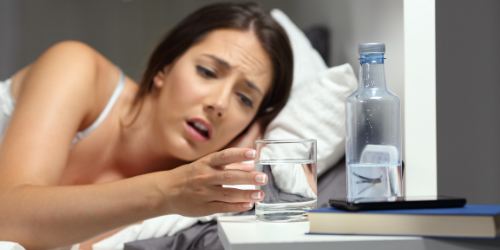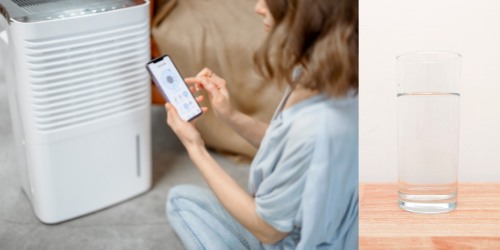Can a dehumidifier dehydrate you?
3 Key Takeaways:
🚀 A dehumidifier cannot dehydrate you. It removes moisture from the air, not from the human body.
🚀 Dehydration occurs due to reasons such as too much humidity, severe heat, physical exertion, underlying health problems, and not enough fluid or liquid intake.
🚀 Using a dehumidifier is safe and can save you from many health problems caused by high indoor humidity levels.
High humidity levels bring different kinds of trouble to your home. The problems that arise from high indoor humidity level does not just stop with mold growth, mildew, damp floors, and ceilings; it also leads to an increase in the content of dust particles, dust mites, skin dryness, allergies, difficulty to breathe and certain respiratory diseases, and more complex health problems. A high humidity level is capable of diminishing the air quality in an entire room.
This is where dehumidifiers step in, to help you out in maintaining a healthy and normal level of relative humidity by working to remove excess moisture from high humidity environments. When you extract excess moisture from the air, you also remove the favorable conditions for mold, mildew, dust, other allergens, and the negative effects of increased humidity levels.
The common question that also makes people wonder is this; ‘If a dehumidifier is equipped to give you dry air in a room, can a dehumidifier dehydrate you?’. It is natural to question the idea and safety behind using a dehumidifier when it works to draw out excessive moisture. When it is capable of giving dry air, low humidity, and extract moisture from damp areas; can a dehumidifier dehydrate you as well?
The answer is NO.
Using a dehumidifier is safe and saves you from many health problems. A dehumidifier cannot lead to dehydration. This occurs for other reasons and you can avoid dehydration, even when you have a dehumidifier running in other ways. Let us head to know more on why the answer to your question ‘Can a dehumidifier dehydrate you?’ is NO.
What are the real causes of dehydration?
The reasons why dehydration occurs are; too much humidity, severe heat, physical exertion, underlying health problems, not enough fluid or liquid intake. These are the main reasons why dehydration takes place.
When your body does not get enough water or fluids that it requires to carry out daily functions, you are going to naturally feel dehydrated. Your body will grow weak, tired, and exhibit other symptoms of dehydration.
High indoor humidity does cause dehydration. Handling too much humidity can be done only by extracting excessive moisture. In order to make this possible and give you a low humidity room, you have to consider using a dehumidifier. Invest in the right energy-efficient dehumidifier to control humidity and remove excess moisture from the air.
What are the symptoms of dehydration?

There are many symptoms that can help you to identify dehydration in your body. If you feel dehydrated or if you notice any of these symptoms rising, immediately drink enough water.
1. Change in colour of urine to dark yellow or orange
2. A drop in urine output
3. Chapped lips
4. Dry throat and dry cough
5. Dry skin
6. A drop in secretion in the mucus membranes
7. Weakness or tiredness, dizziness
8. Fatigue to carry out physical activities and the body’s internal functions.
Does dehumidifier cause dehydration?
As aforementioned, No. A dehumidifier does not cause dehydration. Rather, helps in the regulation of the humidity level, thereby preventing you from facing dehydration as a result of high humidity.
You cannot be dehydrated when you use a dehumidifier. However, there are certain odd conditions that can give you a dry cough, dry skin, or sore throat while using a dehumidifier. If you are not using the right capacity dehumidifiers, it can go ahead in carrying out excess levels of moisture absorption. Prolonged use of dehumidifiers, especially sleeping next to one with a mouth open; can certainly cause you to wake up with a sore throat or cough or dryness in your throat, skin dryness, etc.
This is also the case with any air conditioning environment. If you are exposed to an air conditioner that is blowing out extremely cool air, and you are right under it for hours together, you will feel dehydrated. An air conditioner can also give you the effect of dehydration, although it does not work to make you dehydrated.
Managing incorrect humidity levels with dehumidifier to avoid dryness?

The ideal relative humidity level that is comfortable and healthy for a living space is between 40% to 50%. When moisture levels go beyond that, dehumidifiers have to step in to regulate the humidity level.
When the humidity in the room is not maintained to cater to the needs, that is when too much drying action takes place. You will end up sitting in an environment with extremely dry air that can make breathing difficult and even trigger allergies and respiratory diseases.
There are some ways in which you can ensure your dehumidifier does not overdo its job. Here is how.
✔ Most dehumidifiers come with a built-in humidistat. This equipment is going to help you in monitoring the current humidity level of the room. This is extremely important and can help you to avoid problems with dry air and incorrect humidity.
✔ If your dehumidifier does not have a built-in humidistat, install one.
✔ Put thought and planning into purchasing the right capacity dehumidifier for your room size. The room size is an essential aspect to consider before using a dehumidifier.
✔ The size of the room, the amount of excessive moisture, damp spots, temperature, and relative humidity, expected energy costs or electricity bill, auto shut-off features, etc.; many dehumidifiers are purchased based on these criteria. When you pay attention to these details you will be using a dehumidifier that exactly suits your requirement.
✔ Properly clean the dehumidifier from time to time to avoid freezing the water vapor inside the device. Just like all home appliances need maintenance, so does a dehumidifier, and more so since it deals directly with the air that you breathe in. An unclean device cannot carry out its function accurately and will have trouble maintaining the RH levels.
✔ Place the dehumidifier in the right space for proper functioning.
FAQ Section
1. Can dehumidifiers cause headaches?
Dehumidifiers cannot give you headaches directly, but dry air does. When there is dry air around in the environment, it will bring about the drying of the mucus membranes. When you inhale dry air and it passes through these membranes, it is going to be inflamed and painful, eventually leading to headaches. Ensuring that you use a dehumidifier to dry out the air appropriately can settle this issue.
2. Is it bad to sleep next to a dehumidifier?
Dehumidifiers manufactured nowadays are energy efficient and fire hazard-free models, safe to keep inside a bedroom as well. You will have a peaceful and trouble-free sleep when you got a dehumidifier to monitor the humidity around you and improve the air quality.
However, pay attention to things like the distance of the extension cord from your bed, and signs of smoke coming from the dehumidifier, and other safety measures that you will follow for other home appliances.
3. Where should a dehumidifier be placed in a bedroom?
To permit a dehumidifier make the best use of its potential, the place where it is located in any room matters. The location of the dehumidifier has an influence on its performance. The closer it is to the source of dampness, the better is the moisture absorption and the humidity level regulation.
National Sleep Foundation agrees that when you keep humidity level under control in a bedroom has a positive impact on the quality of sleep that one has. Just like how you enjoy the comfort from cold air coming from an air conditioner to handle the heat; having a dehumidifier in the bedroom to bring down the humidity level also helps.
A central position of the dehumidifier is always recommended in any room it is placed in. However, in a bedroom, you can either do the same or keep it in close proximity to the source of dampness or moisture. If there are leaks or cracks through which moisture escapes into the room, the dehumidifier can be placed close to them in order to fix the issue.
If you happen to have a bathroom inside the bedroom, keep the dehumidifier next to the bathroom door.
4. Does a dehumidifier dry out skin?
If the humidity level drops way under the ideal level, a dehumidifier certainly can give you dry skin, cracked heels, and chapped lips. If you fail to adjust the humidistat, both during the summers and the winters, to balance out the ideal RH; you will end up having an extremely low humidity room. This will cause issues like skin dryness, itchy eyes, and other topical symptoms of moisture in the body.
5. How long does it take for a dehumidifier to dry out a room?
Well, the answer to this question depends on the size of the room and the humidity level dealt with. While using a dehumidifier for the first time, it might take up to 12 hours for the device to start functioning properly. After which it has been noticed that it can take about 17 minutes to 20 minutes to dry out a 50 square feet area; when expected to bring down the humidity from 90% to 40%.
6. Can dehumidifiers cause sore throat issues?
As aforementioned, a dehumidifier can trap the allergens from the air, improve air quality and help you to eliminate allergies; including those of the throat. Also, it is very important to set the humidistat for correct dehumidification settings to prevent sore throat issues.
Wrapping Up
Hope you found your answers to the question ‘Can a dehumidifier dehydrate you?’. Let us know in the mail how you have known dehumidifiers to handle high humidity without causing dehydration. Check our website for more dehumidifier buying guides, inside information on latest dehumidifiers and expert tips on maintaining your dehumidifier.

About The Author
Olivia — a self-confessed air quality addict — is a home climate enthusiast, fresh air advocate, and someone with deep personal experience and knowledge about mold extermination. Her work was mentioned in countless notable humidity publications. Previously she was an editor at Mold Remediation.